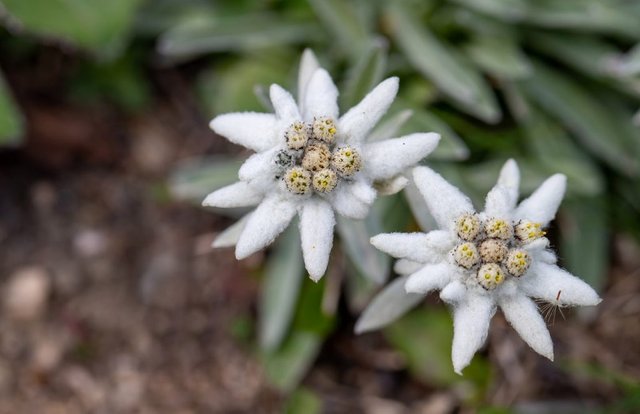
Known by its botanical designation of Leontopodium Alpinum, this mountain flower is one of Europe’s best known. Referred to as Queen Flower, this short-lived star-like perennial belongs to the sunflower family. Other than being pictured on Austria’s euro coins, this flower, traditionally used in folk medicine, is considered a remedy in treating both abdominal and respiratory diseases.
Leontopodium nivale, commonly called edelweiss (German: Alpen-Edelweiß, English pronunciation /ˈeɪdəlvaɪs/ (About this soundlisten)), is a mountain flower belonging to the daisy or sunflower family Asteraceae. The plant prefers rocky limestone places at about 1,800–3,000 metres (5,900–9,800 ft) altitude. It is non-toxic and has been used in traditional medicine as a remedy against abdominal and respiratory diseases. Its leaves and flowers are covered with dense hairs, which appear to protect the plant from cold, aridity, and ultraviolet radiation. It is a scarce, short-lived flower found in remote mountain areas and has been used as a symbol for alpinism, for rugged beauty and purity associated with the Alps and Carpathians, and as a national symbol, especially of Romania, Austria, Bulgaria, Mongolia, Slovenia, Switzerland, and Italy. According to folk tradition, giving this flower to a loved one is a promise of dedication.
The flower's common name derives from the German word "Edelweiß", which is a compound of edel "noble" and weiß "white". In Romania it is known as Floare de colț which means Cliffhanger's flower. The flower is referred to as "Stella Alpina" in the Italian speaking Alps and "Étoile des Alpes" in the French Alps, both names meaning "Star of the Alps".
Edelweiß was one of several regional names for the plant and entered wide usage during the first half of the 19th century, in the context of early Alpine tourism. Alternative names include Chatzen-Talpen ("cat's paws"), and the older Wullbluomen ("wool flower", attested in the 16th century).
The scientific name is a latinisation of the Greek leontopódion, "lion's paw".